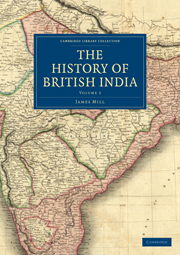Summary
The next of the great transactions, to which the presence of the Governor-General, in the upper provinces, gave immediate existence, was the memorable arrangement which he formed with the Nabob of Oude. In his payments to the Company, that Nabob had fallen deeply in arrear; and the extreme pecuniary distress endured by the Company, rendered it necessary to devise the most effectual means for obtaining what he owed. His country, however, had, by misgovernment, fallen into the greatest disorder: The Zemindars were almost every where in a state of disobedience; the country was impoverished; and the disposition of the people; either deserting it, or pining with want; threatened the evils, or promised the blessings, of a general revolt. Before the connexion between the English and Oude, its revenue had exceeded three millions sterling, and was levied without being accused of deteriorating the country. In the year 1779, it did not exceed one half of that sum, and in the subsequent years fell far below it, while the rate of taxation was increased, and the country exhibited every mark of oppressive exaction.
By the treaty of Fyzabad, formed with the late Nabob, at the conclusion of the Rohilla war, it was agreed, that a regular brigade of the Company's troops should, at the expense of the Nabob, be kept within the dominions of Oude. Even this burthen was optional, not compulsory; and the Court of Directors gave their sanction to the measure, “provided it was done with the free consent of the Subah, and by no means without it.”
- Type
- Chapter
- Information
- The History of British India , pp. 624 - 684Publisher: Cambridge University PressPrint publication year: 2010First published in: 1817



